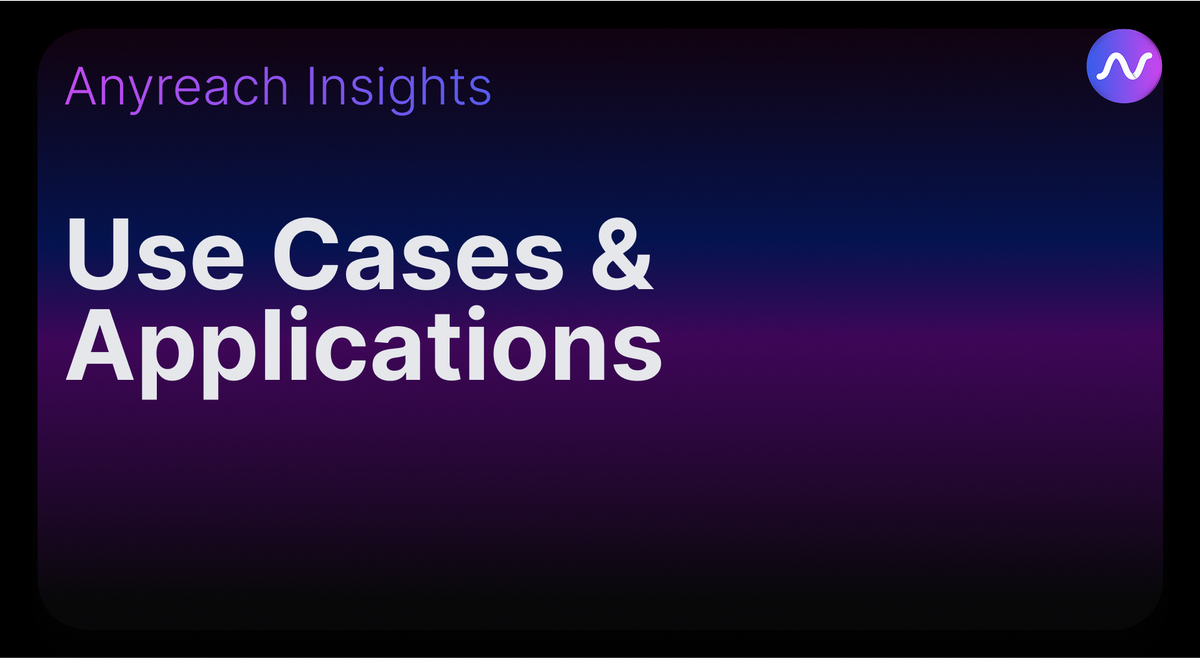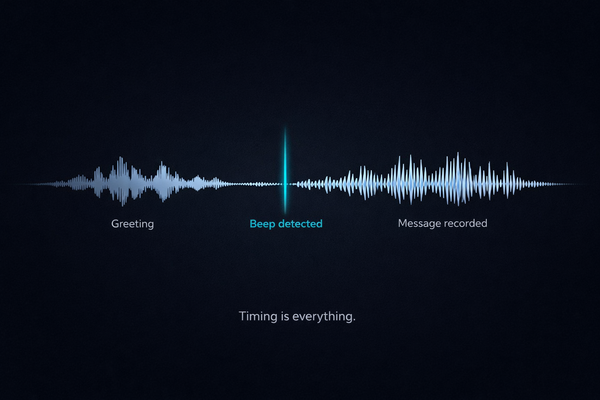How Agentic AI Transforms Enterprise Use Cases: From Customer Support to Sales Automation

What is Agentic AI for Customer Support?
Agentic AI for customer support refers to autonomous AI systems that handle customer interactions across multiple channels, making independent decisions while maintaining service quality. These systems integrate with existing infrastructure to automate routine inquiries, escalate complex issues, and provide 24/7 availability across voice, chat, SMS, and email channels.
Unlike traditional chatbots that follow rigid scripts, agentic AI adapts to each customer interaction dynamically. For enterprises, this means transforming customer support from a cost center into a strategic advantage. According to Gartner, organizations implementing omnichannel AI solutions see up to 40% reduction in support costs while improving customer satisfaction scores.
The technology excels at handling repetitive queries—password resets, order status checks, billing inquiries—freeing human agents to focus on complex, high-value interactions. This shift fundamentally changes how enterprises approach customer service scalability.
Key Benefits for Enterprise Customer Support
- Unified Experience: Customers receive consistent service whether they call, text, or chat
- Intelligent Routing: AI determines the best channel and agent for each inquiry
- Predictive Resolution: Anticipates customer needs based on historical data
- Multilingual Support: Serves global customers without additional staffing
How Does Omnichannel AI Automate Lead Qualification in BPOs?
Omnichannel AI automates lead qualification in BPOs by simultaneously engaging prospects across multiple touchpoints, scoring interactions in real-time, and routing qualified leads to appropriate sales teams. This process reduces qualification time from days to minutes while maintaining personalized engagement at scale.
For BPOs managing thousands of daily leads, manual qualification creates bottlenecks. Agentic AI transforms this by conducting initial discovery calls, sending follow-up SMS messages, and nurturing leads through email campaigns—all while maintaining context across channels. McKinsey reports that BPOs using AI-driven lead qualification see 50% faster conversion rates and 30% higher lead quality scores.
The Lead Qualification Process
| Stage | Traditional Approach | Agentic AI Approach | Time Savings |
|---|---|---|---|
| Initial Contact | Manual dialing, 8-hour coverage | Automated outreach, 24/7 availability | 75% |
| Qualification Questions | Script-based, rigid flow | Dynamic conversation, adaptive questioning | 60% |
| Lead Scoring | Manual entry, delayed processing | Real-time scoring, instant routing | 90% |
| Follow-up | Scheduled callbacks, email only | Omnichannel nurturing, optimal timing | 80% |
The system learns from each interaction, continuously improving qualification criteria. For instance, if prospects from specific industries respond better to SMS outreach, the AI automatically adjusts its approach. This adaptive capability is particularly valuable for BPOs serving diverse client portfolios.
What Are Best Practices for Using Voice AI in Appointment Booking for Healthcare Services?
Best practices for voice AI in healthcare appointment booking include implementing HIPAA-compliant systems, providing clear opt-out options, integrating with existing EMR systems, and maintaining human oversight for complex medical scheduling. Success requires balancing automation efficiency with patient privacy and care quality standards.
Healthcare organizations face unique challenges when implementing voice AI. Patient trust, regulatory compliance, and integration complexity require careful planning. Deloitte's healthcare technology report indicates that properly implemented voice AI reduces no-show rates by 35% while decreasing administrative burden by 50%.
Implementation Framework for Healthcare Voice AI
- Compliance First: Ensure all voice interactions meet HIPAA requirements
- Encrypted data transmission
- Secure storage protocols
- Audit trail maintenance
- Patient-Centric Design: Create natural, empathetic conversational flows
- Clear identification of AI system
- Easy transfer to human agents
- Accommodation for hearing impairments
- Integration Planning: Connect with existing healthcare infrastructure
- EMR synchronization
- Provider schedule management
- Insurance verification systems
How SMS Automation Enhances Outreach in Recruiting for Education Sectors
SMS automation enhances recruiting outreach in education by providing instant, personalized communication with prospective students, achieving 98% open rates compared to 20% for email. This direct channel enables timely reminders about application deadlines, campus visits, and enrollment steps while maintaining conversational engagement.
Educational institutions struggle with engaging digital-native students through traditional channels. SMS automation bridges this gap by meeting students where they are—on their phones. The Education Advisory Board found that universities using SMS automation see 40% higher engagement rates and 25% faster enrollment decisions.
The technology excels at nurturing long enrollment cycles typical in education. From initial inquiry through graduation, SMS maintains consistent touchpoints without overwhelming staff resources. Key applications include:
- Application Status Updates: Real-time notifications reduce anxiety and support calls
- Financial Aid Reminders: Timely prompts prevent missed deadlines
- Event Invitations: Higher attendance for virtual and in-person sessions
- Enrollment Confirmation: Quick responses to secure commitments
IT Troubleshooting Automation: Reducing Ticket Resolution Time
Agentic AI transforms IT troubleshooting by automatically diagnosing issues, executing fixes, and learning from each resolution. This reduces average ticket resolution time from hours to minutes while improving first-contact resolution rates to over 70% for common technical issues.
Traditional IT support models struggle with volume and complexity. Agentic AI addresses this by combining natural language understanding with system access capabilities. When an employee reports "email not working," the AI can:
- Diagnose the specific issue through conversational troubleshooting
- Check system status and user permissions
- Execute approved fixes automatically
- Escalate complex issues with full context
Forrester Research indicates that enterprises implementing AI-driven IT support see 60% reduction in ticket volume and 45% improvement in employee productivity. The impact extends beyond metrics—employees experience less downtime and IT teams focus on strategic initiatives rather than repetitive fixes.
Common IT Issues Suitable for Automation
| Issue Category | Automation Capability | Success Rate | Time Saved |
|---|---|---|---|
| Password Resets | Full automation with identity verification | 95% | 15 minutes |
| Software Access | Provision/deprovision with approval workflow | 85% | 2 hours |
| Network Connectivity | Diagnostic scripts and guided resolution | 75% | 45 minutes |
| Printer Issues | Driver updates and configuration fixes | 70% | 30 minutes |
Sales Automation Through Agentic AI: From Prospecting to Closing
Sales automation through agentic AI orchestrates the entire sales cycle, from identifying prospects to nurturing relationships and facilitating closings. This comprehensive approach increases sales productivity by 50% while maintaining personalized engagement that builds trust and accelerates deal velocity.
Modern sales teams juggle multiple tools, channels, and touchpoints. Agentic AI unifies these elements into a cohesive system that works 24/7. According to Salesforce's State of Sales report, organizations using AI-driven sales automation close 28% more deals while reducing sales cycle length by 18%.
The technology excels at tasks that traditionally consume sales time:
- Intelligent Prospecting: Identifies ideal customer profiles from multiple data sources
- Personalized Outreach: Crafts unique messages based on prospect behavior
- Meeting Scheduling: Handles back-and-forth coordination automatically
- Follow-up Sequences: Maintains engagement without manual intervention
- Pipeline Analytics: Provides real-time insights for strategic decisions
The Automated Sales Workflow
Consider a typical B2B sales scenario. A prospect visits your website, downloads a whitepaper, and provides contact information. Traditional approach: Days later, a sales rep manually follows up. With agentic AI: Within minutes, the system initiates personalized outreach via the prospect's preferred channel, qualifies their needs through natural conversation, schedules a demo with the appropriate specialist, and nurtures the relationship with relevant content—all while the sales team sleeps.
This isn't about replacing salespeople; it's about amplifying their effectiveness. By handling routine tasks, AI enables sales professionals to focus on relationship building and complex negotiations where human expertise shines.
Chat Automation Best Practices for Service-Oriented Companies
Effective chat automation for service companies requires balancing efficiency with empathy, implementing seamless handoffs to human agents, and maintaining context across conversations. Success comes from treating chat as part of an integrated service strategy rather than a standalone channel.
Service-oriented companies—consulting firms, telecom providers, healthcare administrators—face unique challenges. Their customers expect knowledgeable, nuanced responses that go beyond simple FAQ answers. PwC's customer experience research shows that 73% of customers point to experience as an important factor in purchasing decisions, making chat automation quality critical.
Key Implementation Strategies
- Context Preservation: Maintain conversation history across sessions
- Previous interactions inform current responses
- Customer preferences remembered and applied
- Seamless continuation after interruptions
- Intelligent Escalation: Know when human intervention adds value
- Sentiment analysis triggers for frustrated customers
- Complexity thresholds for technical issues
- VIP customer automatic routing
- Proactive Engagement: Initiate conversations based on behavior
- Offer help during long form completions
- Suggest resources based on page views
- Re-engage abandoned sessions
Frequently Asked Questions
How quickly can enterprises see ROI from agentic AI implementation?
Most enterprises see initial ROI within 3-6 months of deployment, with full value realization at 12-18 months. Quick wins come from automating high-volume, repetitive tasks like appointment booking and basic customer support. According to Accenture, companies typically recover implementation costs through operational savings within the first year.
What's the difference between chatbots and agentic AI for customer service?
Traditional chatbots follow predetermined scripts and decision trees, while agentic AI understands context, learns from interactions, and makes autonomous decisions. Agentic AI can handle complex, multi-turn conversations, switch between channels seamlessly, and improve its responses over time without manual programming.
How do enterprises ensure data security with omnichannel AI?
Enterprise-grade omnichannel AI platforms implement multiple security layers including end-to-end encryption, role-based access controls, audit logging, and compliance certifications (SOC 2, HIPAA, GDPR). Data remains within defined geographic boundaries, and AI models can be deployed on-premises or in private clouds for sensitive industries.
Can agentic AI handle industry-specific terminology and processes?
Yes, agentic AI systems are trained on industry-specific data and continuously learn from domain experts. During implementation, organizations upload their knowledge bases, standard operating procedures, and historical interactions. The AI adapts to specialized terminology, compliance requirements, and unique workflows within 2-4 weeks of training.
What happens when agentic AI encounters scenarios it can't handle?
Well-designed agentic AI systems recognize their limitations and seamlessly escalate to human agents. They transfer complete context, including conversation history and attempted solutions, ensuring customers don't repeat information. The AI also learns from these escalations, expanding its capabilities for future similar scenarios.
Conclusion: The Future of Enterprise Automation
Agentic AI represents a fundamental shift in how enterprises approach automation. From transforming customer support into a competitive advantage to revolutionizing sales processes, the technology delivers measurable value across use cases. Success requires thoughtful implementation, focusing on specific business outcomes rather than technology for its own sake.
As Gartner predicts, by 2025, 80% of customer service organizations will abandon traditional contact center models in favor of AI-orchestrated omnichannel experiences. The question isn't whether to adopt agentic AI, but how quickly organizations can integrate it effectively while maintaining their unique value propositions.
The enterprises succeeding with agentic AI share common traits: they start with clear use cases, prioritize user experience, maintain human oversight, and continuously refine their implementations based on real-world results. By following these principles and leveraging the specific applications outlined above, organizations can transform their operations while delivering exceptional experiences to customers, employees, and stakeholders alike.
]]>




![[AI Digest] Agents Coordinate Plan Deploy Scale](/content/images/size/w600/2025/07/Daily-AI-Digest.png)